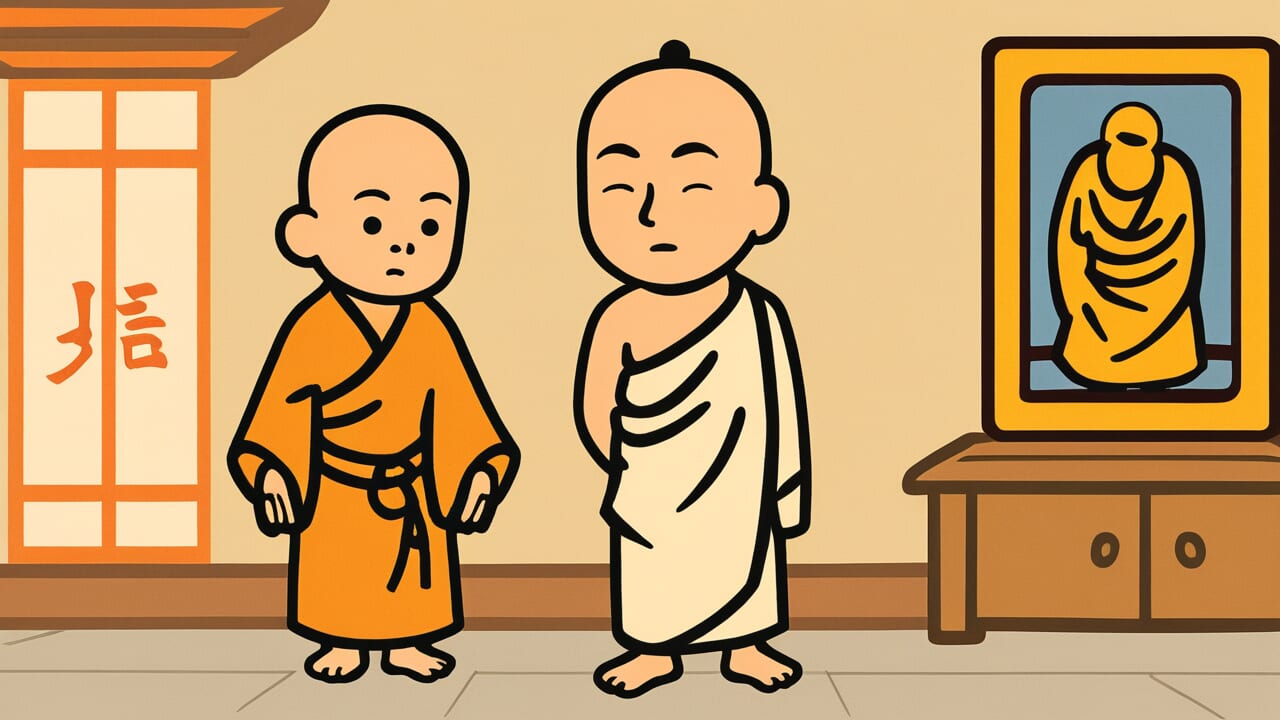How to Read “You cannot become an elder from a novice monk”
Shami kara chōrō ni wa narenu
Meaning of “You cannot become an elder from a novice monk”
“You cannot become an elder from a novice monk” means you cannot reach a high position by skipping the basics.
Everything has a proper order. You cannot skip the beginner stages and jump straight to advanced levels.
This proverb is used for people who try to take shortcuts and neglect fundamentals.
For example, it applies when someone tries to imitate experts without learning basic skills or knowledge.
It also warns against people who ignore entry-level experience and rush to get promoted.
This wisdom still applies today in all fields: academics, sports, arts, and business.
Mastering the basics may seem like a detour, but it’s actually the fastest path to real growth.
This proverb teaches the importance of taking things step by step. It’s practical wisdom for life.
Origin and Etymology
This proverb comes from the ranking system in Buddhist monasteries.
“Shami” refers to a novice monk who has just entered the Buddhist path. They haven’t yet received all the formal precepts and are still in training.
“Chōrō” means an elder monk. These are senior priests who have trained for many years and possess deep knowledge and virtue.
In Buddhism, you start as a shami, then become a biku (fully ordained monk).
Only after many more years of training can you finally reach the status of elder.
This process includes learning precepts, studying scriptures, and practicing meditation and alms-begging. Each stage is essential.
This proverb reflects the strict step-by-step system in monastic training.
Even talented people cannot skip basic training and reach higher spiritual levels. This Buddhist teaching is at the heart of the saying.
The exact first written source is unclear. However, people have passed down this lesson since Buddhism took deep root in Japan.
The proverb captures what monks learned through experience: steady accumulation leads to true growth.
Usage Examples
- He hates basic practice, but you cannot become an elder from a novice monk, so he has no choice but to work steadily
- I tried to skip the programming beginner’s book and start with advanced topics, but I gave up remembering you cannot become an elder from a novice monk and started learning from the beginning
Universal Wisdom
“You cannot become an elder from a novice monk” has been passed down because humans naturally want shortcuts.
Everyone wants quick results and immediate recognition. The basic stage feels boring and unglamorous with no visible achievements.
So we’re tempted to skip it.
But our ancestors learned through countless experiences that such impatience always leads to failure.
People who skip the basics may seem to progress at first. But they always hit a wall somewhere.
Their foundation is unstable, so they collapse at the slightest difficulty.
This proverb contains both a harsh reality and hope.
The reality is that growth takes time. The hope is that anyone can reach great heights by following the proper order.
Success doesn’t depend on talent. It depends on the patience to take things step by step.
Human nature constantly struggles between wanting instant results and understanding the value of steady effort.
This proverb is our ancestors’ answer to that struggle.
The truth that “haste makes waste” never fades, no matter how times change.
When AI Hears This
A fertilized egg can become any cell in the body. It has total potential.
But once it becomes a nerve cell or muscle cell, it cannot change into other cell types. This is called irreversible differentiation.
Professor Shinya Yamanaka won the Nobel Prize for iPS cells precisely because he developed technology to artificially reverse this “no-going-back mechanism.”
This shows how strong the principle of irreversible differentiation is in biology.
What’s interesting is that this principle progresses in stages.
The fertilized egg first divides into three groups: endoderm, mesoderm, and ectoderm. From there, cells differentiate further.
At each stage, options narrow and there’s no turning back.
You cannot become an elder from a novice monk because each training stage has experiences and insights you must gain.
Skip them, and you lack the foundation for growth at the next stage.
In cell differentiation terms, it’s like trying to become a muscle cell without going through the mesoderm stage. Same structure.
Even more notable is that this irreversibility is actually about energy efficiency.
Maintaining cell versatility requires enormous energy. By specializing, cells save energy and gain advanced functions.
Training works the same way. Taking each stage lets you mature efficiently without waste.
Nature is designed not to allow shortcuts.
Lessons for Today
This proverb reminds us of something important in our modern efficiency-focused society.
We live in an age overflowing with information where everything seems instantly available.
That’s exactly why we tend to lose sight of valuing the basics.
If you’re learning something now, don’t underestimate the basic stage.
Even if it feels boring, each small step builds a solid foundation that will support your future.
Others may seem to be progressing faster than you. But there’s no need to rush.
People with solid foundations ultimately grow higher and more steadily.
Modern society often demands immediate results. But truly valuable growth takes time.
Learning the basics carefully is never a waste of time. It’s actually the wisest investment you can make.
Treasure each steady step you take.
Those steps are what will guide you to become someone with real ability.



Comments